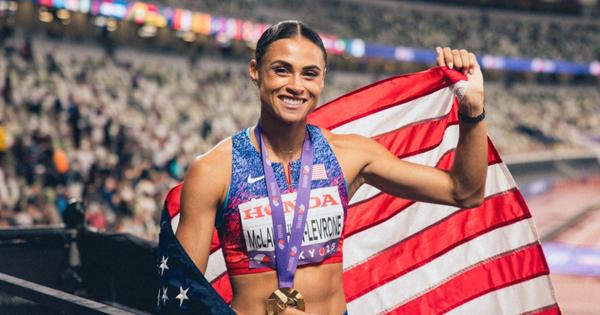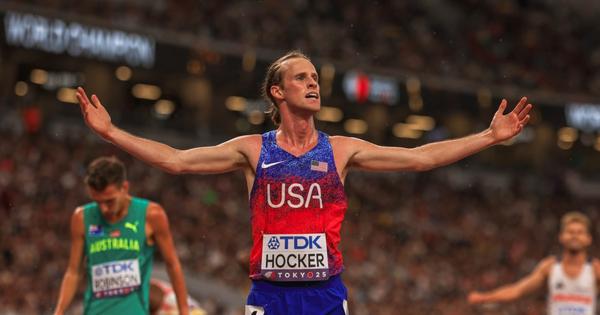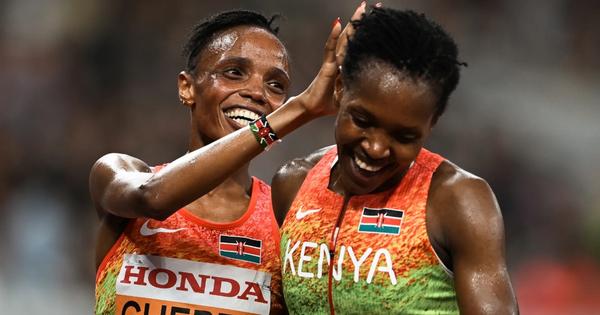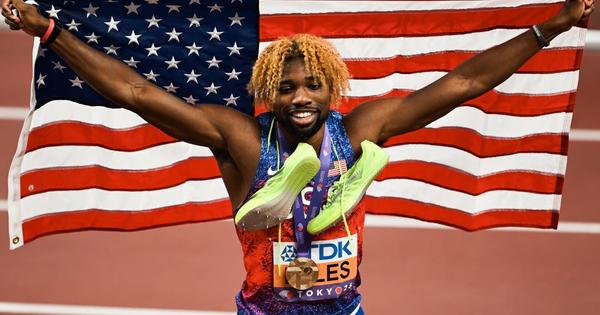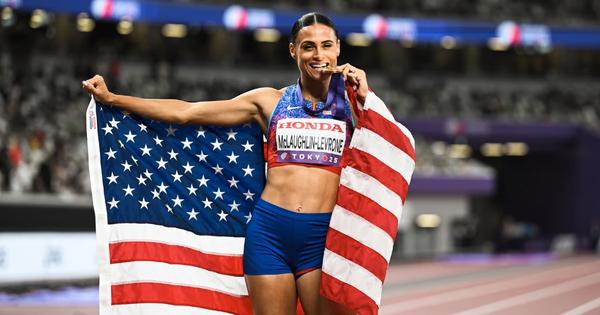By David Melly
September 24, 2025
Another World Championships is in the bag, and what a nine-day week it was. The discus ring in Tokyo’s National Stadium may still be drying out, but with the benefit of a few decent nights’ worth of sleep to shake the jetlag, we feel prepared to reflect on the madness.
More than any meet in recent memory, this one felt full of surprises. The oddsmakers and prognosticators were left scratching their heads and re-sorting their spreadsheets as in event after event, the favorite was felled by a relative unknown. In no event group was this more apparent than the men’s distance events, where only one event—the men’s 800m—produced a fairly expected outcome. The others?
Isaac Nader took the 1500m, Geordie Beamish dethroned Soufiane El Bakkali in the steeple, Cole Hocker won the 5000m, Jimmy Gressier won the 10,000m, and Alphonce Simbu won the marathon.
To be fair, none of these guys are complete unknowns: Nader and Gressier won Diamond League races this season, Hocker and Beamish have gold medals in other events (1500m indoors and out), and Simbu was the bronze medalist back in 2017. But this was certainly not the collection we expected going in.
If there’s any federation that needs to take a hard look in the mirror after Tokyo, it’s Ethiopia. Kenyan women won every event from 800m up through the marathon, whereas Ethiopian athletes only claimed four medals total, two silvers and two bronzes. The men fared particularly poorly, with Yomif Kejelcha’s silver in the 10,000m the only highlight and all three marathoners DNFing.
If you want to look on the bright side, Ethiopian track fans, things can turn around very quickly. This time last year, Jamaica’s sprint ranks were undergoing a similar post-mortem after only winning two medals in Paris, but this season couldn’t be any different: all the surprises were positive, as Jamaica went 1-2 in the men’s 100m and claimed 10 medals overall. Even more promisingly, Shelly-Ann Fraser-Pryce’s farewell tour coincided with a wave of new young talent getting the job done: Oblique Seville (24 years old), Bryan Levell (21 years old), and Tina Clayton (21 years old) all picked up their first medals.
Tokyo was full of memorable see-it-to-believe-it moments, but was it statistically an unusual Worlds? It’s hard to say conclusively, but here’s one way of looking at it. We looked at the last three Olympic cycles to see how many individual gold medalists repeated year-over-year, and based on that metric alone, it was a slightly more unpredictable championship than standard.
2016-2017: 12 repeat champs
2021-2022: 13 repeat champs
2024-2025: 10 repeat champs
That said, the heavy favorites did get the job done in more than a few events. Three athletes completed the “Tokyo-Tokyo sweep”, winning every global championship from 2021 to 2025: Ryan Crouser, Faith Kiypegon, and Mondo Duplantis, the latter of whom set another pole vault world record (of course). Two of the sport’s brightest stars pulled off impressive doubles: Melissa Jefferson-Wooden in the sprints, and Beatrice Chebet in the distance events, and the indefatigable Noah Lyles picked up three more medals, two of them gold.
It’s hard to call anything Sydney McLaughlin-Levrone does a surprise at this point, as pretty much every time she’s toed the line in a championship she proves that the sky is her only personal limit. But it was still a “holy shit” moment to see her shatter Sanya Richards-Ross’s American record in the SEMI-final, and then shatter that record—along with the 48-second barrier—in the final. Without dwelling too much on the negative, it is a huge bummer that performances like Sydney’s in the 400m, Lilian Odira’s in the 800m, and Ethan Katzberg’s in the hammer throw have to be measured up against mid-1980s Soviet-era records, but the silver lining is the closer these athletes get to 40-year-old, highly-suspect marks, the closer we can all get to a record book we feel better about.
All in all, Tokyo delivered the right mix of new arrivals and all-time greats, kooky plot twists and satisfying conclusions. Not one single event felt boring or rote; every final had at least one medalist or performance that defied expectation. While Emmanuel Wanyonyi’s win in the 800m may have been expected, as well as Djamel Sedjati and Marco Arop joining him on the podium for the second year in a row, no one would have guessed going into the championship that the fourth placer would be Irishman Cian McPhillips, breaking his national record for the second time in three days at 1:42.15.
On the final day, two of the relays provided perfect visual metaphors for the 2025 World Championships as a whole. In the women’s 4x100m, Shelly-Ann Fraser-Pryce concluded her epic, 20-year career by literally handing off the baton to Tia and Tina Clayton, ushering in the next generation of Jamaican sprinters. And, of course, they know exactly who they have to contend with, because right next to SAFP was Melissa Jefferson-Wooden, and bringing it all home was Sha’Carri Richardson. In the men’s 4x400m, Team USA scraped its way back into the final via a re-run after a messy prelim, only to still get outkicked by a young, talented Botswana team. While the Americans may have broken the overall medal record at this Worlds with 26 golds, the increasingly global nature of the sport means no one athlete, or team, or nation can get too comfortable for long.
And that’s what makes track and field so fun.

David Melly
David began contributing to CITIUS in 2018, and quickly cemented himself as an integral part of the team thanks to his quick wit, hot takes, undying love for the sport and willingness to get yelled at online.
